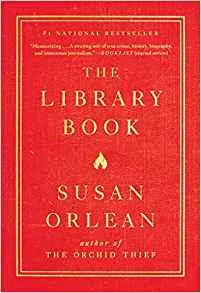Part history, part mystery, part paean to libraries, this book by Susan Orlean is a fascinating read for those of us who love books and libraries. Orlean was a long-time lover of libraries from the time she was a child and shared a ritual weekly visit to her local library in Shaker Heights, Ohio, with her mother. On her website, she says of that time, "The very air in the library seemed charged with possibility and imagination; books seem to have their own almost human vitality." But she fell away as an adult, becoming more of a book buyer than a book borrower and forgot "how magical libraries are." She only reconnected with that buried passion when she began taking her own son to the library.
"On April 29, 1986, the Central Library in downtown Los Angeles caught fire and burned. Nobody died, though 50 firefighters were injured and more than a million books were damaged" (New York Times). No one ever really proved that the library fire was set, although a man, wannabe actor Harry Peak, was accused. But at the time (1986) the place was a firetrap, with poor wiring and books stacked everywhere, including in the stairwells. The NYT review goes on to say, "At any rate, the 1986 fire inside the Central Library, and the subsequent, inconclusive investigation of it, turn out to be a MacGuffin, a trick for luring the reader into a subject into which the reader never imagined he’d be lured: the history and present life of the Los Angeles Central Library. Much of the book consists of its author wandering around a library building, watching and listening to the people inside it." So not only is this a history of the library but also of the people who made it what it is today. It was often chauvinistic--women were not originally allowed in the reading room (it opened in 1873), but by 1885, it was run by women. But then the library board fired a perfectly competent woman director and hired Charles Lummis, a flamboyant journalist, adventurer, and self-promoter, who knew nothing of libraries, to be its director. Orlean offers a larger context to her story as well, providing a historical overview of book and library burning over the centuries. "The Nazis alone destroyed an estimated hundred million books during their twelve years in power."
Some of my favorite passages from the book have more to do with the importance of books in our lives. She notes that "in Senegal, the polite expression for saying someone dies is to say his or her library has burned....Our minds and souls contain volumes inscribed by our experiences and emotions; each individual's consciousness is a collection of memories we've cataloged and stored inside us, a private library of a life lived. It is something that no one else can entirely share, one that burns down and disappears when we die." She reminds us that some cultures, such as Judaism ("the people of the book") consider books sacred. "Destroying a culture's books is sentencing it to something worse than death: It is sentencing it to seem as if it never lived."
If you care about libraries, you'll find this a rewarding read.
Review from The New York Times is very detailed. Additional glowing reviews from The National Book Review, The Guardian, The Washington Post, and Kirkus.
"On April 29, 1986, the Central Library in downtown Los Angeles caught fire and burned. Nobody died, though 50 firefighters were injured and more than a million books were damaged" (New York Times). No one ever really proved that the library fire was set, although a man, wannabe actor Harry Peak, was accused. But at the time (1986) the place was a firetrap, with poor wiring and books stacked everywhere, including in the stairwells. The NYT review goes on to say, "At any rate, the 1986 fire inside the Central Library, and the subsequent, inconclusive investigation of it, turn out to be a MacGuffin, a trick for luring the reader into a subject into which the reader never imagined he’d be lured: the history and present life of the Los Angeles Central Library. Much of the book consists of its author wandering around a library building, watching and listening to the people inside it." So not only is this a history of the library but also of the people who made it what it is today. It was often chauvinistic--women were not originally allowed in the reading room (it opened in 1873), but by 1885, it was run by women. But then the library board fired a perfectly competent woman director and hired Charles Lummis, a flamboyant journalist, adventurer, and self-promoter, who knew nothing of libraries, to be its director. Orlean offers a larger context to her story as well, providing a historical overview of book and library burning over the centuries. "The Nazis alone destroyed an estimated hundred million books during their twelve years in power."
Some of my favorite passages from the book have more to do with the importance of books in our lives. She notes that "in Senegal, the polite expression for saying someone dies is to say his or her library has burned....Our minds and souls contain volumes inscribed by our experiences and emotions; each individual's consciousness is a collection of memories we've cataloged and stored inside us, a private library of a life lived. It is something that no one else can entirely share, one that burns down and disappears when we die." She reminds us that some cultures, such as Judaism ("the people of the book") consider books sacred. "Destroying a culture's books is sentencing it to something worse than death: It is sentencing it to seem as if it never lived."
If you care about libraries, you'll find this a rewarding read.
Review from The New York Times is very detailed. Additional glowing reviews from The National Book Review, The Guardian, The Washington Post, and Kirkus.
.jpeg?format=300w)
No comments:
Post a Comment